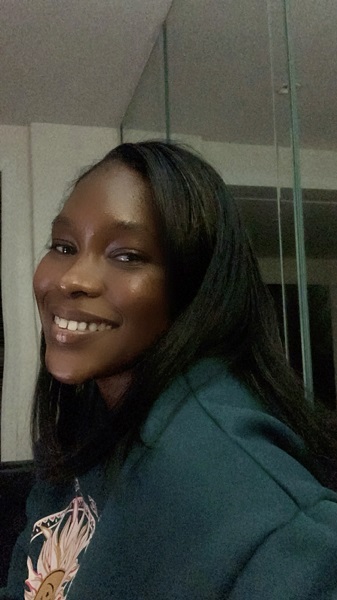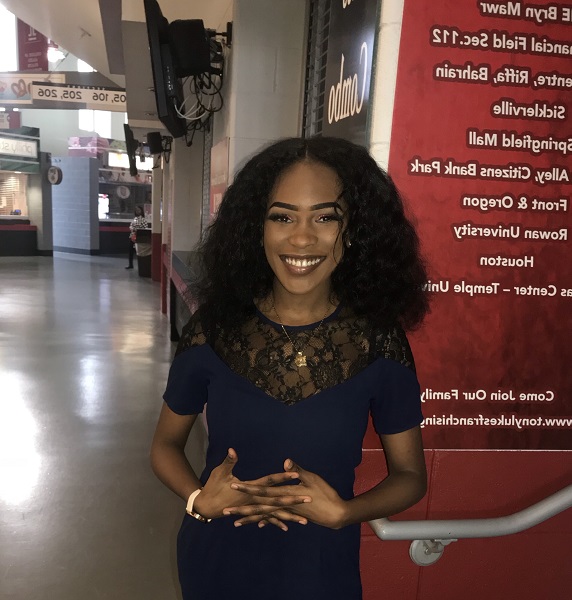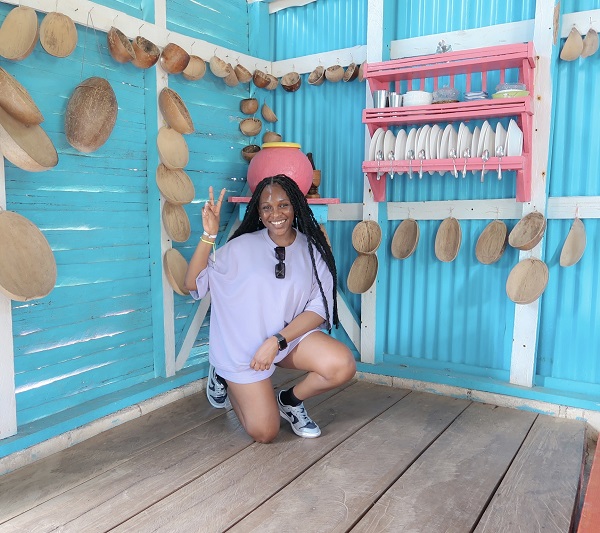Why a nutrition sciences degree?
July 28, 2022
 Sona Diallo is simultaneously finishing up a bachelor’s degree in nutrition and foods and certification as a lactation consultant and completing her first year as a graduate student in the Master of Science in Nutrition and Dietetics. Diallo is taking advantage of the BS/MS Bridge program offered by Drexel University’s College of Nutrition and Health Professions (CNHP).
Sona Diallo is simultaneously finishing up a bachelor’s degree in nutrition and foods and certification as a lactation consultant and completing her first year as a graduate student in the Master of Science in Nutrition and Dietetics. Diallo is taking advantage of the BS/MS Bridge program offered by Drexel University’s College of Nutrition and Health Professions (CNHP).
Diallo started her college career at Community College of Philadelphia intending to go to Temple’s medical school then into family medicine. However, while taking the prerequisite nutrition course her path changed completely. “I fell in love with nutrition right off the bat,” Diallo beamed. “I was like, wait, people can actually get paid to talk to people about this?” Her professor, a registered dietitian, told her that indeed nutrition is a terrific career, and that Drexel had a great program. “While I did my research, it dawned on me that dieticians are health care providers who specialize in how food is broken down in the body and can heal, not just comfort.” Diallo loved the idea of how influential food is on all our systems. She also noticed how few people in nutrition sciences look like her and wanted to change that.
 Diallo called all her classes enjoyable and would be hard-pressed to pick a favorite. She appreciates the small classes since it gives her an opportunity to build meaningful relationships with her professors like to one that she has with Professor Susan McGinley. “She is one of the most impactful teachers I've had in my entire life,” said Diallo. “I had my first class with her, and she really got to know me, my culture and my background. I thought if this is how all my courses will be, I am absolutely in the right place!” She remarked that one of the strengths of CNHP’s Nutrition Department is its size. "We will have the same professors first year, second year and third year which is the greatest thing about the nutrition department. Our professors track our growth throughout our time here.” Diallo knows that she can go to any of her professors, especially McGinley, whenever she wants to understand something more clearly, ask questions and share ideas.
Diallo called all her classes enjoyable and would be hard-pressed to pick a favorite. She appreciates the small classes since it gives her an opportunity to build meaningful relationships with her professors like to one that she has with Professor Susan McGinley. “She is one of the most impactful teachers I've had in my entire life,” said Diallo. “I had my first class with her, and she really got to know me, my culture and my background. I thought if this is how all my courses will be, I am absolutely in the right place!” She remarked that one of the strengths of CNHP’s Nutrition Department is its size. "We will have the same professors first year, second year and third year which is the greatest thing about the nutrition department. Our professors track our growth throughout our time here.” Diallo knows that she can go to any of her professors, especially McGinley, whenever she wants to understand something more clearly, ask questions and share ideas.
Diallo is tackling areas where she sees a need for vast improvement—food insecurity, opening career doors for people of color and nutritional health of mothers and children. Wanting to go into pediatric nutrition, when looking at ways to affect kids’ general well-being, starting with mothers made a lot of sense to her. After hearing Susan Fuchs, MS, the director of the Human Lactation Program, give a lecture in one of her classes, Diallo recognized an interesting opportunity—do both at the same time. She could explain to women who recently gave birth how to properly feed their babies whether they choose to breast- or bottle-feed while cleverly finding ways to give nutrition lessons that will benefit mom while talking about the ups and downs of lactation. “It’s the earliest time to shape a child’s habits and behaviors,” described Diallo. “If I can influence someone to do something positive, that means a lot.” That’s the heart of an innovator.
 Through courses, professors, rotations and peers, Diallo is developing into a knowledgeable healthcare provider with an ability to check her biases at the door and approach every situation with cultural competency. That is underscored in every class she takes. “I must be able to communicate with people who have different cultural, ethnic and religious backgrounds than mine.” To be the clinician each person needs, she meets them where they are and builds trust and rapport. Diallo says openness is key. “Being open to learning, being open to new experiences and being open to change is what helps me grow.”
Through courses, professors, rotations and peers, Diallo is developing into a knowledgeable healthcare provider with an ability to check her biases at the door and approach every situation with cultural competency. That is underscored in every class she takes. “I must be able to communicate with people who have different cultural, ethnic and religious backgrounds than mine.” To be the clinician each person needs, she meets them where they are and builds trust and rapport. Diallo says openness is key. “Being open to learning, being open to new experiences and being open to change is what helps me grow.”
Written by Roberta S. Perry